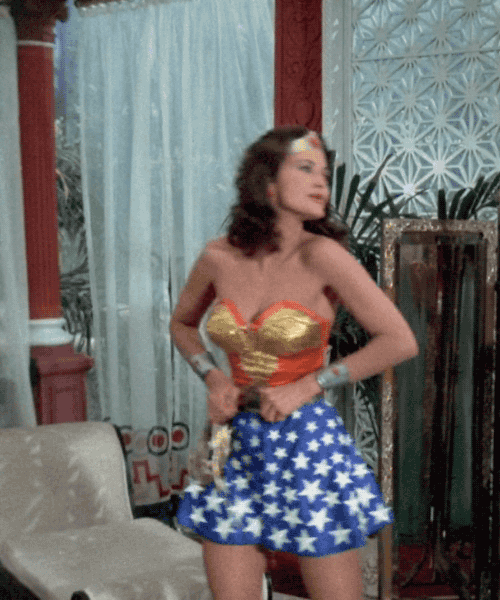PHENOMENALITY: *marvelous*
MYTHICITY: *fair*
FRYEAN MYTHOS: *adventure*
CAMPBELLIAN FUNCTION: *metaphysical*
WONDER WOMAN, one of the first successful live-action superhero TV shows following BATMAN '66, was, to be charitable, unimpressive. I tend to credit its run of three seasons to the immense charisma of Lynda Cater as the titular heroine, and maybe a little to the composers to the catchy-if-corny theme song.
Certainly the ratings success of the 90-minute-format pilot was not due to the phlegmatic work of director Leonard J. Horn, for whom ORIGINAL was his final effort. And though the writer of the episode, Stanley Ralph Ross, almost certainly got this job due to his experience from working on the Bat-series, ORIGINAL's script is so sloppy that I have new appreciation for Lorenzo Semple's oversight as the executive story editor for BATMAN '66.
Ross sustains none of the wit seen on the Bat-series; it's pure corn all the way-- and disinterested corn as well. The setup is reasonably efficent: Nazis want to sabotage a vital bombsight innovation in the U.S., and pilot Steve Trevor (Lyle Waggoner) flies out to foil an aerial raid on the bombsight-factory. Trevor succeeds but has to jettison from his plane. He lands on Paradise Island, which, for no reason we're ever told, happens to be located in the mysterioso Bermuda Triangle.
Once we meet Princess Diana, her mother Hippolyta (Cloris Leachman) and the rest of the island's populace of hot young women, Ross's sloppiness goes into overdrive. Diana says something about how it's been a "thousand years" since the Amazons saw a man, which would mean they went into island-exile back in the 4th century A.D. Hippoluta later says, more correctly, that it's been "thousands of years," but why the exile at all? The script doesn't really say, though there's a dim suggestion that it was because Hippolyta had some unhappy love affair (though it's not quite said that Diana was the fruit of that union). When Hippolyta gives a very abbreviated account of the exile, Diana seems not to know what she's talking about, or even that she's immortal. Yet much later in the story, she claims to have been familiar with "Rome and Greece." I don't resent the producers dropping unwieldly concepts like the Greek pantheon of gods, but they should have made Wonder Woman's origins internally consistent.
A little better is the use of a sporting contest to decide which Amazon returns Trevor to his world; this goes pretty much like in the comic, though with far less spectacular action. Once Diana wins the contest, there's not much explanation as to why Hippolyta has made her a special costume, much less an optional skirt that can be removed in favor of bikini briefs. (This was, to be sure, an element of the comics: WW started with a skirt that was quickly replaced by shorts.) The only hint of an explanation is that the costume includes an "Amazon belt," which I think was supposed to prevent Diana from aging once she was off the island, and maybe to allow her to keep her fantastic super-strength. But this too is inconsistent; during her real-world adventures Wonder Woman can lift a car, but she has to struggle to defeat an ordinary female Nazi-- probably because the producer wanted a good long catfight. The belt seems to be the only actual borrowing from Greek myth, insofar as one of Hercules' labors included the hero's acquisition of "the girdle of Hippolyta," and this trope was incorporated into the comic-book origin of Wonder Woman.
The plot is the usual tissue of coincidences-- those Nazis sure did have an extensive fifth column, even if it consists of less than fearsome figures like Stella Stevens and Red Buttons. For that matter, Trevor's blossoming romance with his "angelic" savior gets short shrift, and Wonder Woman's fight-scenes are only impressive insofar as Lynda Carter is impressive. She only makes a few "women's lib" comments-- these being the only reason the pilot earns even fair mythicity-- but because Carter is at once sweet and authoritative, she sells the importance of the feminine mystique to the winning of the World War. To the best of my recollection, for the rest of the series, Carter remained pretty much the only strong point of the show, even if she became far less impressive when not garbed in Amazon array.

You're entirely correct, GP - the show's 'success' was purely down to the impressive charms of Lynda Carter. I can remember none of the stories, but I'll never forget Lynda. No need to wonder - she's definitely a woman!
ReplyDeleteI can remember a few loose premises-- "Wonder Woman Meets an Alien," "Wonder Woman Meets Roy Rogers"-- but yeah, the stories don't even stick with me as well as those of the worst of the Irwin Allen shows.
ReplyDeleteFun fact I didn't have room for: I'm pretty sure that on some WW DVD producer Douglas Cramer said that he intentionally arranged catfights in the first season because he thought they would boost the show with older male viewers. (Cramer later indulged that fetish to the utmost working on DYNASTY.) I think the catfights petered out after a half dozen episodes, but no idea if the objection was too much violence or the absurdity of a super-strong woman having to struggle to overcome an ordinary human female.